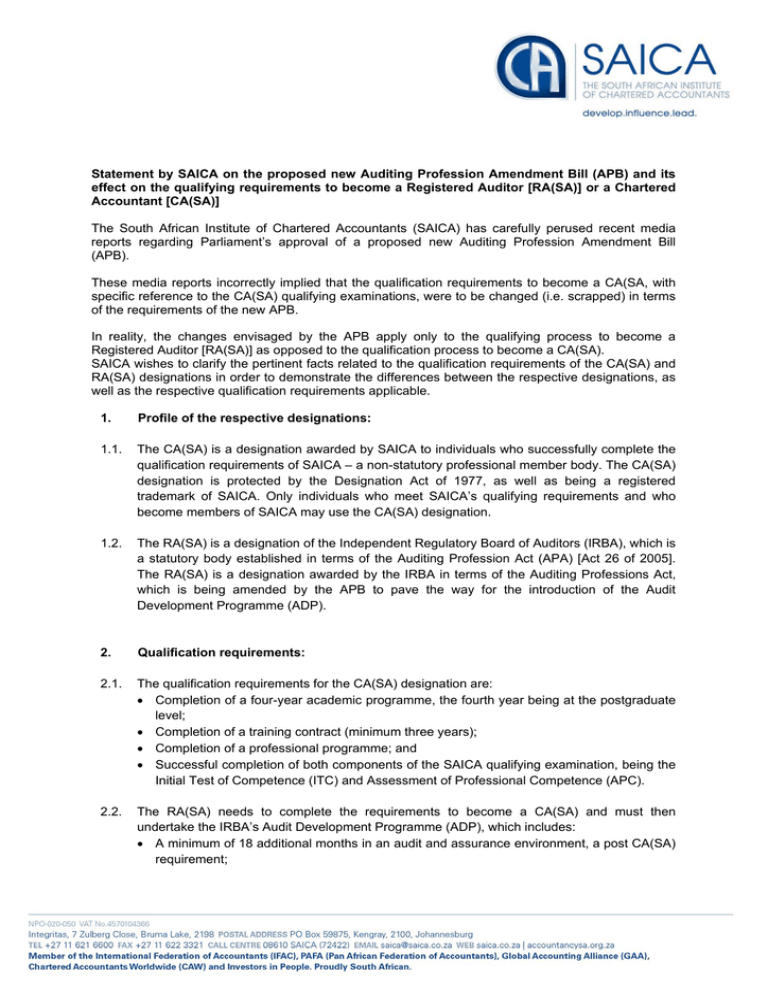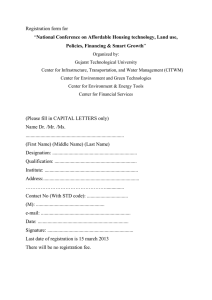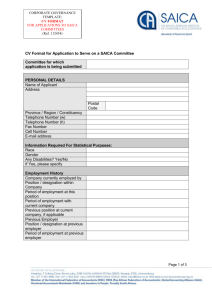Statement by SAICA on the proposed new Auditing Profession
advertisement

Statement by SAICA on the proposed new Auditing Profession Amendment Bill (APB) and its effect on the qualifying requirements to become a Registered Auditor [RA(SA)] or a Chartered Accountant [CA(SA)] The South African Institute of Chartered Accountants (SAICA) has carefully perused recent media reports regarding Parliament’s approval of a proposed new Auditing Profession Amendment Bill (APB). These media reports incorrectly implied that the qualification requirements to become a CA(SA, with specific reference to the CA(SA) qualifying examinations, were to be changed (i.e. scrapped) in terms of the requirements of the new APB. In reality, the changes envisaged by the APB apply only to the qualifying process to become a Registered Auditor [RA(SA)] as opposed to the qualification process to become a CA(SA). SAICA wishes to clarify the pertinent facts related to the qualification requirements of the CA(SA) and RA(SA) designations in order to demonstrate the differences between the respective designations, as well as the respective qualification requirements applicable. 1. Profile of the respective designations: 1.1. The CA(SA) is a designation awarded by SAICA to individuals who successfully complete the qualification requirements of SAICA – a non-statutory professional member body. The CA(SA) designation is protected by the Designation Act of 1977, as well as being a registered trademark of SAICA. Only individuals who meet SAICA’s qualifying requirements and who become members of SAICA may use the CA(SA) designation. 1.2. The RA(SA) is a designation of the Independent Regulatory Board of Auditors (IRBA), which is a statutory body established in terms of the Auditing Profession Act (APA) [Act 26 of 2005]. The RA(SA) is a designation awarded by the IRBA in terms of the Auditing Professions Act, which is being amended by the APB to pave the way for the introduction of the Audit Development Programme (ADP). 2. Qualification requirements: 2.1. The qualification requirements for the CA(SA) designation are: Completion of a four-year academic programme, the fourth year being at the postgraduate level; Completion of a training contract (minimum three years); Completion of a professional programme; and Successful completion of both components of the SAICA qualifying examination, being the Initial Test of Competence (ITC) and Assessment of Professional Competence (APC). 2.2. The RA(SA) needs to complete the requirements to become a CA(SA) and must then undertake the IRBA’s Audit Development Programme (ADP), which includes: A minimum of 18 additional months in an audit and assurance environment, a post CA(SA) requirement; A minimum of 1 500 productive hours, overseen through oversight by an experienced RA(SA); Achievement of the audit competence requirements; Submission of regular feedback and reports (six-monthly); Submission of a Portfolio of Evidence on completion of the ADP; Recognition of Prior Learning (RPL) will be considered under certain circumstances; and Inclusion in the APA of a Registered Candidate Auditor (RCA). 3. Recognition 3.1. SAICA is fully responsible for setting and administering both the ITC and APC qualifying exams to become a CA(SA). 3.2. The IRBA recognises the SAICA qualifying CA(SA) process, with the ADP being a further RA(SA) specialist requirement by the IRBA post the CA(SA) initial designation acquisition. 4. Professional Standing 4.1. Currently, out of SAICA’s more than 38 475 CA(SA) members, some 4 300 are RAs(SA). The successful achievement of the CA(SA) designation is not subject to the achievement of the RA(SA) status. 4.2. The IRBA is the regulatory body for the audit part of the broad accountancy profession and only a RA(SA) is permitted to express an opinion on any organisation’s set of financial statements as part of the audit process. Currently CAs(SA) who are also RAs(SA) are mandated by the IRBA to audit financial statements. The implication of the amendments to the APB paves the way for the implementation of the ADP, which is an additional specialisation requirement for CAs(SA) to register as RAs(SA). Read the communication from the IRBA which further clarifies and confirms the new requirements of the ADP. As such, there is therefore no change to the SAICA qualification requirements as the qualifying examinations (namely the ITC and APC) remain part of the qualification standards to become a CA(SA). There is accordingly no question of a reduction of qualification standards for the CA(SA) designation, or the RA(SA), as implied by commentators in recent media articles. For further information contact me on mandio@saica.co.za or 011 621 6600 Regards Mandi Olivier Senior Executive: Professional Development

